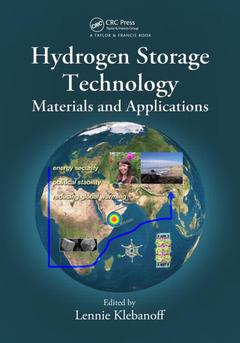Hydrogen Storage Technology Materials and Applications
Coordonnateur : Klebanoff Lennie

Zero-carbon, hydrogen-based power technology offers the most promising long-term solution for a secure and sustainable energy infrastructure. With contributions from the world?s leading technical experts in the field, Hydrogen Storage Technology: Materials and Applications presents a broad yet unified account of the various materials science, physics, and engineering aspects involved in storing hydrogen gas so that it can be used to provide power. The book helps you understand advanced hydrogen storage materials and how to build systems around them.
Accessible to nonscientists, the first chapter explains how a hydrogen-based energy carrier and storage infrastructure is required to address fuel resource and political insecurities as well as global climate change. The second chapter describes high-efficiency hydrogen conversion devices, including internal combustion engines and fuel cells, for producing power and electricity.
The book then dives into the state of the art in hydrogen storage technology. It covers recent hydrogen storage materials research and hydrogen storage methods, with an emphasis on solid-state techniques. It also reviews codes and standards and explores engineering approaches for creating zero-emission, hydrogen-fueled power systems.
Collecting recent results from around the globe, this book gets you up to date on the latest hydrogen-based technology for mitigating energy and environmental risks. It provides a deep science and engineering-based description of hydrogen storage materials and clearly explains how the materials are engineered for zero-emission, carbon-free power systems.
Section I The Need for Hydrogen in the 21st Century and Devices for Converting It to Power: The Need for Hydrogen-Based Energy Technologies in the 21st Century. Hydrogen Conversion Technologies and Automotive Applications. Section II Hydrogen Storage Materials and Technologies: Historical Perspectives on Hydrogen, Its Storage, and Its Applications. Hydrogen Storage in Pressure Vessels: Liquid, Cryogenic, and Compressed Gas. Hydrogen Storage in Interstitial Metal Hydrides. Development of Onboard Reversible Complex Metal Hydrides for Hydrogen Storage. Storage Materials Based on Hydrogen Physisorption. Development of Off-Board Reversible Hydrogen Storage Materials. Section III Engineered Hydrogen Storage Systems: Materials, Methods, and Codes and Standards: Engineering Properties of Hydrogen Storage Materials. Solid-State H2 Storage System Engineering: Direct H2 Refueling. Engineering Assessments of Condensed-Phase Hydrogen Storage Systems. Codes and Standards for Hydrogen Storage in Vehicles. Index.
Lennie Klebanoff is a scientist with Sandia National Laboratories, where he has been leading efforts in fuel cell market transformation, including the development of a mobile lighting system used on the red carpet at the Academy Awards and Golden Globes shows. Dr. Klebanoff was previously Director of the U.S. Department of Energy’s Metal Hydride Center of Excellence and Environmental Team Leader for the Extreme Ultraviolet Lithography program. He was also a Professor of Chemistry at Lehigh University, where he invented the technique of spin-resolved x-ray photoelectron spectroscopy. He earned a PhD in physical chemistry from the University of California, Berkeley. Dr. Klebanoff holds 23 patents and is the author of over 95 scientific papers.
Date de parution : 12-2012
17.8x25.4 cm
Date de parution : 11-2016
17.8x25.4 cm
Thèmes de Hydrogen Storage Technology :
Mots-clés :
Hydrogen Storage; Mol H2; hydrogen-based power technology; Hydrogen Storage Systems; secure and sustainable energy infrastructure; Metal Hydrides; Hydrogen Storage Technology; Hydrogen Storage Materials; Complex Metal Hydrides; storing hydrogen gas; Ammonia Borane; hydrogen-based energy carrier and storage infrastructure; Fuel Cell; fuel resource and political insecurities; PEM Fuel Cell; solutions to global climate change; NaAlH4; high-efficiency hydrogen conversion devices; American Chemical Society; hydrogen combustion engines; Complex Hydrides; hydrogen fuel cells; H2 Desorption; hydrogen storage methods; Hydrogen Release; zero-emission; hydrogen-fueled power systems; Sodium Alanate; energy and environmental risks; H2 Release; carbon-free power systems; PEM; hydrogen storage engineering; RSC Publishing; 11B NMR Spectroscopy; Effective Thermal Conductivity; Metal Borohydrides; 11B NMR; Carbon Aerogel; Hydrogen Desorption; Hydrogen Storage Properties



